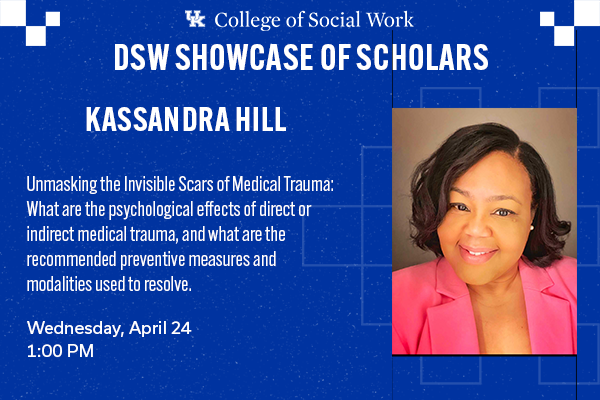DSW Candidate – Kassandra Hill, LICSW, 1:00 PM – 2:15 PM
$0.00
Virtual Showcase of DSW Scholars 2024 Event!
Unmasking the Invisible Scars of Medical Trauma: What are the Psychological Effects of Direct or Indirect Medical Trauma, and What are the Recommended Preventive Measures and Modalities Used to Resolve
DSW Candidate – Kassandra Hill, LICSW
Wednesday, April 24, 2024
1:00 PM – 2:15 PM Eastern Time Zone
Credit Hours: 1.0
Description
Unmasking the Invisible Scars of Medical Trauma: What are the Psychological Effects of Direct or Indirect Medical Trauma, and What are the Recommended Preventive Measures and Modalities Used to Resolve
Depression, anxiety, post-traumatic stress disorder, and acute stress disorder are some of the long-term effects of medical trauma that can be mitigated by early diagnosis and treatment. This emphasizes the necessity of prompt recognition and diagnosis of medical trauma. We will discuss the impact of the effects of medical trauma on mental health and the development and maintenance of coping skills after medical trauma.
The benefits of addressing and treating a stressor as it occurs will have a significant impact on the management of medical trauma in the medical setting. Implications of developing assessment tools, trauma intervention plans, what administering modalities during a trauma would look like, and identifying appropriate means to reduce medical noncompliance due to untreated symptoms of medical trauma. The purpose of this capstone is to acquire a deeper understanding of how these victims can be identified and how their symptoms improve or persist over time.
By assessing and identifying those at early risk, it may be possible to reduce the risk of re-traumatization, ascertain best practices, and improve clinical care. Early identification of medical trauma permits clinicians to initiate interventions and evidence-based modalities as soon as feasible to mitigate long-term PTSD symptoms such as anxiety, depression, flashbacks, and nightmares. This information is important because medical trauma affects millions of people daily and goes unrecognized, undiagnosed, and undertreated.
It is a medical crisis that literally hides in plain sight. There are many gaps in the literature and research for medical trauma. There are modalities that are used to treat medical trauma.
Learning Objectives:
- How to define medical trauma
- How to identify symptoms of medical trauma
- Common modalities used for treatment of medical trauma
Delivery Method: Live Interactive Training via Zoom Video Conferencing
Credit Hours: 1.0 (ACE)
Target Audience: This conference is intended for social workers and students.
Accreditation: University of Kentucky College of Social Work, Provider # 1377, is approved as an ACE provider to offer social work continuing education by the Association of Social Work Boards (ASWB) Approved Continuing Education (ACE) program. Regulatory boards are the final authority on courses accepted for continuing education credit. ACE provider approval period: 9/29/22-9/29/25. Social workers participating in this conference will receive up to 15 general continuing education credits.
Claiming CE Credit: Instructions for claiming CE credit will be disseminated at the beginning of each session.
Questions: If you have any questions regarding CE credit or to report a grievance, please contact Melissa Whitaker at melissa.whitaker@uky.edu. For technical assistance, please contact lmshelp@uky.edu.
